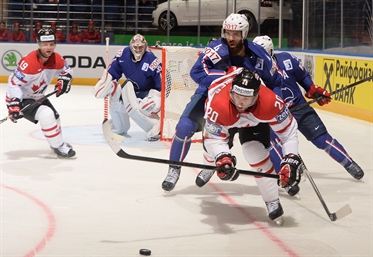New century of upsets
New century of upsets
What history tells us about FRA edging CAN

 MINSK, BELARUS - MAY 9: France's Antonin Manavian #4 battles for the puck with Canada's Troy Brouwer #20 during preliminary round action at the 2014 IIHF Ice Hockey World Championship. (Photo by Richard Wolowicz/HHOF-IIHF Images)
MINSK, BELARUS - MAY 9: France's Antonin Manavian #4 battles for the puck with Canada's Troy Brouwer #20 during preliminary round action at the 2014 IIHF Ice Hockey World Championship. (Photo by Richard Wolowicz/HHOF-IIHF Images)
In the wake of Friday’s shocking 3-2 loss to Les Bleus, some Canadian fans are experiencing panic. For others, it’s embarrassment, rationalization, or outright dismissal.
All of those reactions are understandable, given that the motherland of hockey is still riding high on February’s Olympic triumph in Sochi. With Canada’s great depth of talent, it seems unfathomable to some that the French, 12th in the IIHF World Ranking, could ever top the red Maple Leaf.
However, the most clear-headed reaction would go something like this:
“Congratulations on a well-played game, France. This, however, does not mean that Hockey Canada’s entire staff should be fired and the players sent home in disgrace. These things happen sometimes due to the increasing parity in international hockey. Also, one isolated round-robin upset in the new millennium does not necessarily point to a disastrous final outcome.”
Now, if you have four round-robin upsets in a row, then you might have a problem, as history shows.
In 2000, a stacked Russian host team featuring Pavel Bure, Alexei Yashin, and Sergei Gonchar lost 3-0 to the United States, 3-2 to Switzerland, 3-2 to Latvia, and 1-0 to Belarus in St. Petersburg. No wonder they bottomed out in 11th place.
Canada also suffered one of its biggest upsets that year with a 4-3 defeat against Norway. But while the Canadians went home empty-handed, they came just one goal short of a medal, falling 2-1 to Finland in the bronze game.
It all hinges on how you deal with adversity. Do you confront it head-on and learn from it? Or does it make you fall apart?
“There's certainly lots to learn,” said Canadian coach Dave Tippett after the loss to France. “I think in this situation it's good to have adversity.”
Unfortunately for the American teams of 2003 and 2010, they weren’t able to parlay that attitude into success. In 2003, the Americans fell 5-2 in their opener versus Denmark, making its return to the elite division for the first time since 1947. In 2010, the U.S. lost 2-1 to host Germany at the Veltins-Arena in Gelsenkirchen before a then-world record crowd of 77,803. In both cases, they ended up having to play in the relegation round.
(Canada, incidentally, settled for a 2-2 tie with the Danes in 2003 that year, but still wound up beating Sweden in the final. The Canadians did the same thing the following year, except in 2004 the 2-2 tie was with a different underdog, Austria.)
The Czechs lost to both Norway and Switzerland in group play in 2010, but found their game when it counted most, achieving one-goal playoff wins over Finland, Sweden, and Russia en route to their latest gold medal.
Have there been much bigger upsets in international hockey history? Of course. None of the aforementioned ones are on par with the 1980 “Miracle on Ice” where American college players beat the Soviet Union’s best 4-3 in their prime at the Lake Placid Olympics.
The point is this: while a team like France should take beating Canada as a major milestone and confidence-builder for its national program, a team like Canada can still go on to medal if it doesn’t experience the crisis of confidence that Russia had in 2013 after losing 2-1 to...who was that again?
Oh yes, France.
One week later, the United States ended Russia’s reign as champions with a 8-3 quarter-final shellacking.
Back to Overview

















































































